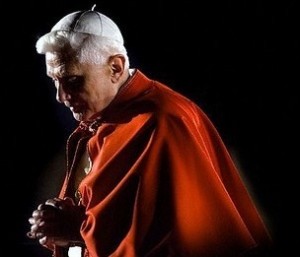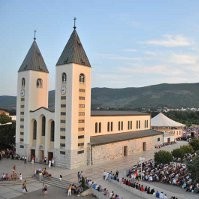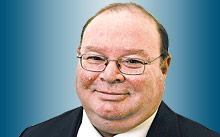On 29 April 2009, Pope Benedict made a pilgrimage to the tomb of Pope St Celestine V, the saintly pope who abdicated in 1294 and retired to a monastery.
The pilgrimage caused a bit of murmuring on the blogosphere. Why would Benedict visit that pope? Sure he was canonised, but he was removed from the calendar in the 1960s. Could Benedict be contemplating abdication?
Benedict concluded his visit to Celestine’s tomb by leaving his pallium there. The pallium is a woollen vestment worn on the shoulders of metropolitan bishops. Receiving the pallium is an important part of the pope’s own installation ceremony. Pope Benedict has worn a few over the years. But the one he left with St Celestine is the long pallium — the one of ancient design — which he received when he became pope:
On 4 July 2010, the Pope made another pilgrimage — this time to some relics of Pope Celestine not far from Rome. More eyebrows were raised. More murmuring echoed through the blogosphere.
In retrospect, it seems that Benedict fostered this devotion to St Celestine precisely because the possibility of his own abdication played on his mind. In contrast, Pope John Paul II repeatedly ruled out the option, when he was pressed in interviews. “There is no place in the Church for a pope emeritus,” I think he once said.
Benedict has always sung a different tune. In Light of the World, the book-length interview published in 2010, he said this:
If a pope clearly realizes that he is no longer physically, psychologically, and spiritually capable of carrying out the duties of his office, then he has the right, and in some circumstances the obligation, to resign.
And now he has resigned. In his statement to the cardinals, he appealed to his failing health:
. . In today’s world, subject to so many rapid changes and shaken by questions of deep relevance for the life of faith, in order to govern the barque of Saint Peter and proclaim the Gospel, both strength of mind and body are necessary, strength which in the last few months, has deteriorated in me to the extent that I have had to recognize my incapacity to adequately fulfill the ministry entrusted to me.
Whatever his motives, I think we can be confident of the Pope’s discernment. He’s probably prayed about this for years. His abdication is obviously not an act of infallibility, but I am personally convinced that he has discerned the will of God wisely and prayerfully.
It behooves us to imitate Benedict’s prayerfulness. We can pray for him obviously: for his health, and for his future. And we can pray for the cardinals: that they attend to the Holy Spirit and elect a worthy successor. And we can pray for ourselves: that we are filled with filial love for our new Holy Father.








Good Bye and Good Riddance to the Most Regressive Leader of the Catholic Church since the Middle Ages.
Grow up!
You are of course entitled, Butch, to believe Benedict is regressive. But here you have made an historical claim which is simply not true. We need to beware hyperbole and ideology because they easily lead us away from truth and into falsehood.
Rude and unnecessary
Moderator? Wherefore art thou?
The papacy in our time of great urgency for the Church to evangelise; to strengthen the burgeoning faith in the third world and to try and revive it in the first, means the pope must travel. I have every confidence Benedict has done the best and the right thing. We have been extremely fortunate in the past century to have good popes; it was not ever thus…
Here is the mystic conspiracy behind it all…
http://www.patheos.com/blogs/standingonmyhead/2013/02/duane-mandible-on-popes-resignation.html
Thanks for your blog on the resignation of Pope Benedict XVI. Well written. Hope you are well and enjoying Hamilton. What a humble man is our present Pope. In our prayers always.
@ butch.
The Church has always been progressive, it is society and the secular who hold your opinion who are regressive.
I have only known two Popes in my lifetime, and now an upcoming third, I will miss Pope Benedict XVI as I do his Predecessor Pope John Paul II, they were men of outstanding Faith in a world that has turned to secularism and immoral practices. They both were always very strong defenders of life, especially that in regard to the unborn in a world were they are snuffed out under laws that were passed by Godless Men. Thankyou Pope Benedict, you will be in my prayers, and so will you Butch.
Why not make that other great ruler and person of faith Queen Elizabeth II the new Pope!
Not only is she a stable and honourable leader of many but her Papacy would end the schism between the Anglicans and Catholics, bring the Catholics into the 21st century in terms of recognition of women in religion and therefore show the world how united and progressive the church has become 🙂